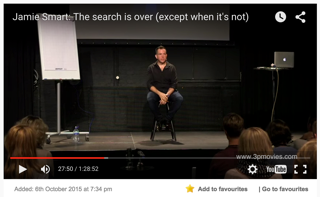JST 92 – The biggest challenge and the simplest solution
“And the idea, psychologically, to explain the game of life is to let people realise: if you drop your ego (your image of self-importance) and simply be you – just you, whoever you are – you’ll find the secret to heaven here on earth.”
– Sydney Banks
We live in a rapidly-changing world where we are regularly being told what we should do, how we should do it, who we should be and how we should be showing up. When I first started exploring the principles behind clarity, I heard a simple suggestion which shocked me to my core, and flew in the face of the culture of personal development I’d been immersed in for many years. I found myself issued with a challenge and tantalised with a solution, all in the same sentence. The suggestion came from the philosopher Sydney Banks, who said “Be ordinary”.
I hated the idea of being ordinary. It bothered me. After all, I’d spent years thinking big, awakening the giant within and trying to be a highly effective person. And while it was somewhat tiring, I could point to the places where my efforts had paid off. OK, so I wasn’t feeling very happy or fulfilled, and often struggled with a kind of “what’s the point” melancholy, but at least I had something to show for my struggles. The idea of “being ordinary” didn’t just seem like a quitters game; it seemed lazy and foolish, like I’d miss out on all the good things life had to offer.
Back in 2005, I watched the wonderful “Leonard Cohen: I’m Your Man”, a documentary about the Canadian singer-songwriter. Cohen explained that he’d been exploring buddhism and meditation for many years, and said “I found that things became a lot easier when I no longer expected to win. You abandon your masterpiece and sink into the real masterpiece.” His insight really touched me, and I loved the second half of it (“…sink into the real masterpiece”), but I struggled with the first half (“…no longer expected to win”). On reflection, it seems that even 10 years ago, my spirit was attracted to the simple beauty of the ordinary, while my ego was repelled by its implications.
Yet it stayed with me, and as time passed, I began to see more deeply into the wisdom behind this counter-intuitive direction. Here’s a way of thinking about it…
DISTINCTION: Being ordinary VS Striving to be extraordinary
– Striving feels discontented because they’re not who, where or what they want to be. Ordinary feels content with who they are today.
– Striving is busy in anticipation of future pleasures. Ordinary appreciates the pleasures of life.
– Striving is trying to make an impression, and to come across in a certain way. Ordinary knows they are enough as they are.
– Striving can’t wait to get past the moment, is rushing to get to a future promise. Ordinary is free to enjoy the moment, and savour its beauty.
– Striving works furiously to prove themselves. Ordinary has nothing to prove.
So why would a person be striving to “be extraordinary”? Because they don’t realise how extraordinary they already are. You are the spearhead of evolution; a miracle of form and function. You’ve learned to walk and talk and read and you don’t even know how you did it. You’re a conduit for wisdom, inspiration and fresh perspectives that come from beyond your personality, from the essence of who you really are. And who are you really? You are the masterpiece, the intelligence of life in all its glory. You don’t need to prove a thing.
By the way, I’ve written this article as much to myself as to you. We all get caught in striving sometimes, and we all have the capacity to wake up to the wonder of the ordinary in any moment. So relax. You’re already extraordinary. Just like everyone else 😉
To your increasing clarity,
Big love
Jamie
P.S. I’ve now selected 23 of the 36 people who are going to be joining me for my final ‘Project Glasswing’ programme of 2015, launching at the end of October. We have 13 places left, and here’s what I’m going to be looking for:
– You are a coach, therapist or change-worker (Eg. Sports coach, psychotherapist, hypnotherapist, business coach, bodyworker, homeopath etc)
– You have at least one year’s experience of working with clients (either paid, pro-bono or both)
– You probably charge by the hour, but want to use a “coaching package” model to increase your income & make it more consistent
– You have space in your practice to work with at least one longer term contract client, starting in November
– You’re an enthusiastic, friendly people-person
– You have a coachable spirit, and are willing to step out of your comfort zone if necessary, and
– You can keep a secret
If that’s you, then just email me at info@jamiesmart.com, and let me know where you’re located and a little about yourself (if you don’t know what to tell me about, look at the list above for inspiration). NB: Make the subject line “Project Glasswing JST”. I’ll be choosing people in the next couple of weeks. Talk to you soon! J
